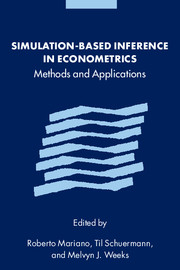Book contents
- Frontmatter
- Contents
- List of contributors
- Foreword by M. Hashem Pesaran
- Part I Simulation-based inference in econometrics: methods and applications
- Part II Microeconometric methods
- Part III Time series methods and models
- Introduction
- 7 Simulated moment methods for empirical equivalent martingale measures
- 8 Exact maximum likelihood estimation of observation-driven econometric models
- 9 Simulation-based inference in non-linear state-space models: application to testing the permanent income hypothesis
- 10 Simulation-based estimation of some factor models in econometrics
- 11 Simulation-based Bayesian inference for economic time series
- Part IV Other areas of application and technical issues
- Index
9 - Simulation-based inference in non-linear state-space models: application to testing the permanent income hypothesis
Published online by Cambridge University Press: 04 August 2010
- Frontmatter
- Contents
- List of contributors
- Foreword by M. Hashem Pesaran
- Part I Simulation-based inference in econometrics: methods and applications
- Part II Microeconometric methods
- Part III Time series methods and models
- Introduction
- 7 Simulated moment methods for empirical equivalent martingale measures
- 8 Exact maximum likelihood estimation of observation-driven econometric models
- 9 Simulation-based inference in non-linear state-space models: application to testing the permanent income hypothesis
- 10 Simulation-based estimation of some factor models in econometrics
- 11 Simulation-based Bayesian inference for economic time series
- Part IV Other areas of application and technical issues
- Index
Summary
Introduction
Non-linear filtering has been developed in various directions beyond the classic linear/normal filtering theory of Kalman (1960) and Kalman and Bucy (1961).
One approach is to apply a Taylor series expansion to linearize the non-linear measurement and transition equations. The linear recursive algorithm is then applied to this modified system. Procedures in this genre – such as the extended Kalman filter and the second-order non-linear filter – are discussed in Wishner, Tabaczynski, and Athans (1969), Sorensen and Alspach (1971), Alspach and Sorenson (1972), Gelb (1974), Anderson and Moore (1979), and Tanizaki and Mariano (1996).
Proceeding in another direction, others have sought to avoid normality assumptions by working on recursive algorithms for updating probability density functions. Kitagawa (1987) and Kramer and Sorenson (1988) evaluate densities through numerical integration. Alternatively, simulation techniques are a natural tool for evaluating these densities. Monte Carlo integration with Gibbs sampling is explored in Carlin, Polson, and Stoffer (1992). Monte Carlo integration with importance sampling in this context is discussed in Tanizaki (1993), Tanizaki and Mariano (1994), and Mariano and Tanizaki (1995). Further modifications of these procedures – using rejection sampling – are discussed also in Tanizaki and Mariano (1998).
In this chapter, we consider the application of these non-linear/non-normal filtering techniques to testing the permanent income hypothesis. Numerous papers have revisited this celebrated hypothesis. Flavin (1981), Hall and Mishkin (1982), and Campbell and Mankiw (1987) examined this issue taking transitory consumption into account.
- Type
- Chapter
- Information
- Simulation-based Inference in EconometricsMethods and Applications, pp. 218 - 234Publisher: Cambridge University PressPrint publication year: 2000
- 2
- Cited by



